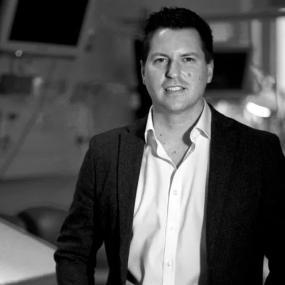Who still believes in Santa and science?

2020 Faculty of Intensive Care Medicine and NIHR Clinical Early Years Awardee.
As I look through my office window at yellowing patches of summer grass, it may seem strange to talk about Christmas. But these are strange times. I remember being told that there are three stages of life – first you believe in Santa, then you don’t believe in Santa, then you are Santa.
As the recipient for the 2020 Faculty of Intensive Care Medicine and NIHR Clinical Early Years Award, I’ve been asked to say a few words about my journey in science. And whilst my lab is far removed from a toy workshop in the North Pole, the path I have taken is too filled with change, filled with doubt, and filled with fancy dress.
Growing up in a tough Welsh comprehensive school, I told my careers tutor that I wanted to be Fox Moulder from The X-Files. After not quite knowing what to say, she asked ‘Why?’ I told her it was the combination of mystery, science and humanity which made this a great show. Hearing that, and seeing my grades in science were much better than the humanities, medicine became my hopeful destination. This is when I believed in Santa. This is when I believed in science.
Taking a quantum leap forward by a decade, doubt had crept in. Christmas presents were now bought not wished for and medicine seemed to be a mechanical process of finding and applying guidelines which left humanity cold. I had fancy-dress costumes to wear, the white coat, but science was gone. The mystery had gone and what was left were patients with problems that could sometimes be fixed. I didn’t believe in Santa, nor science anymore. It was a distant flickering light no longer showing me which way to go but rather a distraction from the job.
And that was when I met Chris. A young student, passionate about travel, Chris had long dreamt of going on a far-flung trip with his school. A few months before turning eighteen, his dream came true and he travelled to Africa. Shortly after climbing Mount Kenya, even helping some children from the local slum get to the top, Chris became critically unwell. After being cared for in a local hospital, he was brought back to the UK. Six weeks after climbing one of the highest mountains in Africa, Christopher died just days after the candles on his 18th birthday cake were blown out. He had died of sepsis. The three questions his mum asked in our intensive care family room after Chris died would make me reconsider my belief in science. She asked, ‘Why him? Why didn’t the antibiotics work? What can be done to help others?’
And it is because of these three simple yet impossible to answer questions that I am now writing this. They led me back towards that guiding light of science, to do a PhD in the immunology of critical illness. Eventually gaining a consultant post in intensive care nearly 20 years after starting medical school, has allowed me to continue to ask tricky questions as part of one big research team. Only by asking these questions can we hope to find answers to help patients like Chris and their families. If you too have lost belief, found doubt, think about science. Think about research. Think about becoming Santa. I did, and that could have been the end of my story.
Yet remembering back to what I had told my careers tutor, to what had attracted me to medicine in the first place it was the promise of mystery, science and humanity. I had arrived in a place where the mystery and science had returned thanks to research. But the humanity had not. I had spent a decade writing dry academic papers that few people would ever read. I had been speaking at conferences around the world where most of the audience knew the topic I was speaking of better than me. But I’d forgotten about that important aspect of humanity. I wanted to answer Chris’ mum’s questions. And to tell her those answers. And that couldn’t be done through a meta-analysis alone.
And so I wrote a book, called ‘Critical – the science and stories from the brink of life’. It was only really intended for friends and family who would often ask ‘So what actually do you do in intensive care?’ It was written to try to answer those questions that Chris’ mum had asked. It was written really so I would do what I had hoped when starting medicine – to combine mystery, science and humanity.
And so now we have now arrived where we started. I’ve been through belief and then doubt and hopefully back again. My belief in science, and research, and medicine is now as much focused on finding answers to tricky questions as explaining those answers to whom they matter the most. Thank you so much to the Faculty of Intensive Care Medicine and NIHR Clinical Research Network for supporting me and countless others to keep doing this.
